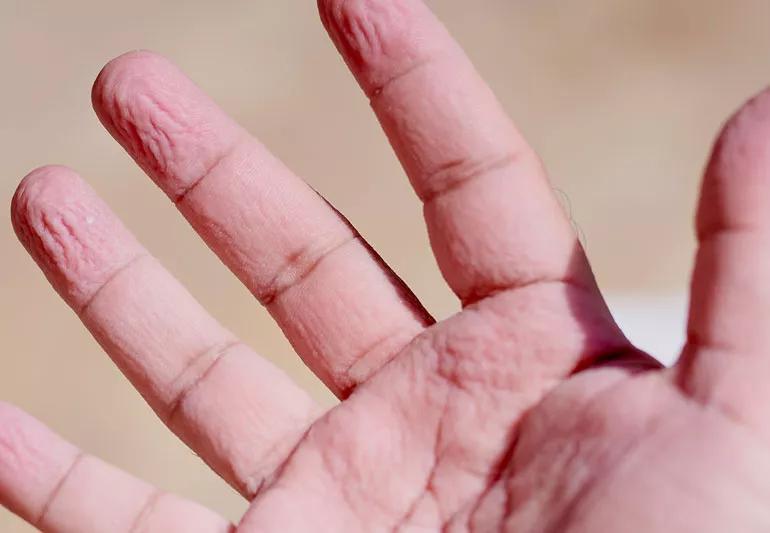Your blood vessels shrink and your skin forms wrinkles to help you grip objects

Do you love taking long, hot showers or soaking in the tub? Or perhaps you swim like a fish and hit the pool every day?
Advertisement
Cleveland Clinic is a non-profit academic medical center. Advertising on our site helps support our mission. We do not endorse non-Cleveland Clinic products or services. Policy
You’ve surely noticed the curious effect of water on your skin.
“After just a few minutes in wet conditions, the palms of your hands, the soles of your feet and, in particular, your fingertips, will transform from smooth to wrinkly,” says dermatologist Alok Vij, MD.
But why do fingers prune? Dr. Vij explains the science behind it and offers some tips to protect your skin from other skin issues.
So, what gives — shouldn’t exposure to water plump your skin up like a plum, rather than wrinkling it like a prune?
“This is a fascinating question,” says Dr. Vij. “That ‘pruning’ is more than just passive absorption of water into the protein-rich outer layer of your skin. It’s an active, adaptive process controlled by your sympathetic nervous system.”
Your sympathetic nervous system is part of a larger system in charge of unconscious body processes like digestion and breathing.
It’s mainly responsible for the “fight-or-flight response” that helped us run from a saber tooth tiger in prehistoric times.
And it’s believed that pruney skin is caused by your blood vessels shrinking and your skin forming wrinkles to help you grip objects better in wet conditions — allowing you to grab the slippery, wriggling fish our bodies needed for survival back in the day.
Advertisement
“The grooves appearing in your skin act like tire treads,” explains Dr. Vij. “They allow water to slide out from between the surface of your fingertips and the surface of objects you’re trying to grasp — like that bar of soap you just dropped.”
Yes, developing pruning skin while in water is harmless and happens to everyone. You may have heard someone say they have pruning fingers or prune hands or prune skin — and most often, pruney fingers. Once out of the water, your skin should return to normal.
And while pruning skin is common, it’s best not to overstay your skin’s welcome in a shower or tub.
“Once your skin starts to prune, that’s your signal to wrap things up,” says Dr. Vij.
So, what can you do to avoid pruney skin? Ideally, you want to bathe in warm, not hot, water to avoid removing the natural oils from your skin.
And as soon as you get out, towel-dry briefly. Then, quickly apply moisturizer to add moisture back into your skin’s outer layer.
For those who love to take a dip in the pool or swim laps, pruning happens more often — but the bigger concern is what else can happen to your skin by being submerged in water for so long.
“Frequent swimmers encounter bigger problems than wrinkling of their fingers,” notes Dr. Vij.
Constant exposure to water, chlorine and other chemicals can cause dry skin, eczema or folliculitis.
To avoid the skin irritation, itching, inflammation or infection that result, Dr. Vij advises you to:
“These tips will help you enjoy swimming’s many benefits without consequences for your skin,” says Dr. Vij.
If you have pruning skin from being in water, there’s typically no need to stress. It’s a normal occurrence and a way of your body protecting and helping you.
But if you notice pruney or wrinkly skin and you haven’t been in water, it may signal a health condition like:
In those cases, it’s always best to talk to your doctor about your symptoms.
“Our skin tells fascinating stories about the way humans have adapted to the environment,” reflects Dr. Vij. “And its response to prolonged exposure to water is no different.”
Advertisement
Learn more about our editorial process.
Advertisement

Topical treatments — and even some cosmetic procedures — may help reduce the appearance of this crinkled-paper look

What you can do for laugh lines and facial creases

The convenient option is good for touch-ups, but it shouldn’t replace your traditional sunscreen

At-home options aren’t your best bet — instead, consider noninvasive laser treatments with a dermatologist

An enzyme deficiency or rosacea are potential causes of alcohol flush

Some things you find in your house have antifungal properties — but that doesn’t mean they’ll clear your toenail fungus

Home remedies are unlikely to cure your contagious foot fungus — and they might even make it worse

To avoid swimmer’s eye, wear goggles, use eye drops and flush out your eyes with fresh, clean water when irritated

If you’re feeling short of breath, sleep can be tough — propping yourself up or sleeping on your side may help

If you fear the unknown or find yourself needing reassurance often, you may identify with this attachment style

If you’re looking to boost your gut health, it’s better to get fiber from whole foods